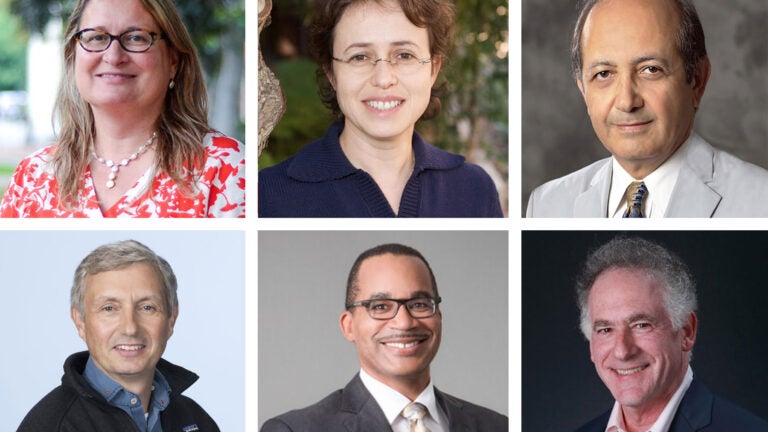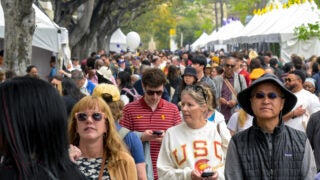
USC researchers elected to the American Association for the Advancement of Science in 2020 are Yolanda Gil, Leana Golubchik, Behrokh Khoshnevis, Paul Newton, Timothy Pinkston and Ray Stevens, clockwise from top left. (Photos/Courtesy of each AAAS fellow)
6 USC researchers named 2020 AAAS fellows
The USC professors join 40 previously selected faculty members as fellows of the American Association for the Advancement of Science.
The council of the American Association for the Advancement of Science has elected six USC faculty members to the rank of AAAS fellow for 2020.
Selected by the council each year, AAAS members whose “efforts on behalf of the advancement of science, or its applications, are scientifically or socially distinguished” are elected to become AAAS fellows through a judicious process.
AAAS fellows are comprised of scientists, engineers and innovators who have been honored for their achievements across various fields, including research, technology, industry and government, teaching, excellence in communication and interpreting science to the public. The newly elected AAAS fellows will be honored at the Fellows Forum in conjunction with the AAAS annual meeting in February, which will be held virtually.
Yolanda Gil
Yolanda Gil is the senior director of major strategic initiatives in artificial intelligence and data science at the USC Information Sciences Institute and a research professor at the USC Viterbi School of Engineering. Gil was honored with the 2020 AAAS fellow distinction for outstanding contributions to the field of artificial intelligence for supporting scientific discovery.
“I am very excited and humbled by this recognition,” she said. “I have been involved in AAAS from a research and from a policy perspective. On the research side, I have been working on AI for science for over a decade, working with scientists in different areas, especially neuroscience, genomics and climate. On the policy side, I have been involved with AAAS activities on safe and responsible use of AI and other technologies.”
A key research project Gil has been working on is automating writing scientific papers. Her team’s initial focus is automating the methods section of papers, which builds on her previous work on reproducibility and provenance. This is part of one of Gil’s long-term research directions of automating hypothesis-driven discovery, in which Gil and her team study how scientists decide what data to collect, what methods to select and how to look at the resulting evidence. “We identify the cognitive tasks involved, capture the knowledge they use so we can automate their reasoning,” she said. “This would significantly accelerate scientific advances.”
In addition to nearly 30 years of prolific work in AI, Gil has served as chair of the Special Interest Group on Artificial Intelligence at the Association for Computing Machinery (ACM) and was president of the Association for the Advancement of Artificial Intelligence. Gil is also a fellow of both organizations.
Leana Golubchik
Leana Golubchik is the Stephen and Etta Varra Professor and a professor of computer science and electrical and computer engineering at USC Viterbi. She also serves as the director of USC’s Women in Science and Engineering program. Her research focuses on the design and analysis of distributed systems. In particular, she is recognized for her work on multimedia servers and content collection systems. Her research set the stage for successful online media delivery streaming services, such as Hulu and Netflix, by overcoming key challenges in scalability, reliability and quality of service.
Among other key firsts, her content collection system Bistro addressed the need for scalability, efficiency, fault tolerance and security while providing fundamental insight into the general upload problem and solutions using public hosts. These breakthroughs facilitate applications such as the online collection of income tax forms, conference papers and grant proposals. Currently, Golubchik is focusing her research efforts on distributed deep learning and privacy engineering.
“I believe that using modeling and analysis techniques that provide fundamental insight into problems leads to the design and development of better systems and technologies, which in turn improve people’s quality of life,” she said.
Golubchik has received several awards in the past, including the IBM Faculty Award, the National Science Foundation’s CAREER Award, the Okawa Foundation Award and the IBM and National Science Foundation doctoral fellowships.
Behrokh Khoshnevis
As the Louise L. Dunn Endowed Professorship in Engineering and Distinguished Professor of Civil and Environmental Engineering, Astronautics, and Aerospace and Mechanical Engineering, USC Viterbi’s Behrokh “Berok” Khoshnevis focuses on the advancement of construction scale 3D-printing technology, which he conceived, developed and demonstrated at USC for over two decades. The technology, called contour crafting, has pioneered a revolution in the field of construction, he said. It uses cementitious materials for 3D printing of full-scale buildings and infrastructure elements.
Over his career, he has invented three major 3D-printing technologies. The other two are selective inhibition sintering (SIS), which allows for the fabrication of objects with a variety of polymers and metals at a lower cost than competing technologies, and selective separation shaping (SSS) for the fabrication of objects with metals that have a high melting point as well as fabrication of ceramic objects. SIS has been licensed to Hewlett-Packard, while SSS was conceived in the course of a NASA-funded project for the construction of planetary landing pads.
“In particular, the most recent technology — contour crafting — can help build custom-designed structures much faster and at a lower cost than current methods. This includes helping support dignified and affordable housing for low-income populations and comfortable and livable emergency shelters for long-term use,” Khoshnevis said. He added that the technology will reduce harmful waste and emissions while also helping eliminate accidents and injuries in an extremely hazardous field. It can also help support construction in space.
Looking forward, Khoshnevis is keen to pursue an idea he calls “telefacturing,” which is remote manufacturing through telerobotics, virtual reality and haptics instruments and with extensive use of artificial intelligence, machine learning, Internet of Things and high-speed/high-band 5G networks.
“The approach will protect the workers in epidemic conditions, such as COVID-19, as well as from occupational hazards and accidents,” he said.
Paul Newton
Paul Newton, professor of aerospace and mechanical engineering and mathematics at USC Viterbi, focuses on mathematical oncology and developing computational, mathematical and data-driven models for cancer progression. This includes developing models for chemo-schedule optimization using an evolutionary game theory framework; developing predictive models of metastatic progression for patients with advanced diseases to help forecast their future course; and using machine-learning and data-based methods to classify tumor cells for various types of tumors, helping to characterize their invasive potential.
Collaborations with clinicians from major cancer centers, such as the MD Anderson Cancer Center and Memorial Sloan Kettering, have allowed him to use real patient data for many different cancer types to develop these models. Recently, his research group began a new collaboration with the Brain Tumor Center at the USC Norris Comprehensive Cancer Center. Being able to accurately quantify the efficacy of different possible treatment scenarios that could be used to help cancer patients is incredibly valuable to major medical-university centers like USC, Newton said.
“I consider one of the goals of everything we do as attempting to add value to the clinical teams by helping them better understand and interpret the data they generate,” he said. “If they think our models can help them make better decisions for their patients, I am more than thrilled to participate.”
Currently, Newton is working on developing models to predict brain metastases for breast and lung cancer patients in collaboration with the Brain Tumor Center.
Timothy Pinkston
Timothy M. Pinkston, USC Viterbi professor and holder of the George Pfleger Chair in Electrical and Computer Engineering, has been elected as a 2020 AAAS fellow for distinguished contributions to the field of computer architecture, and particularly interconnection network routing algorithms, and leadership in expanding computing research and broadening participation in computing.
He and his research group develop advanced communication architectures for next-generation computer systems. His research focuses on the design and evaluation of high-performance interconnection networks, routers and hardware architectures for improving the speed, throughput and energy efficiency of data movement in many-core, multiprocessor and distributed computing systems.
Pinkston, who also serves as vice dean for faculty affairs at USC Viterbi and formerly served a three-year stint as a program director at the National Science Foundation, is a dedicated contributor to advancing computing research. During his career, he has also worked tirelessly to grow participation in the field and improve diversity.
“I contend that it is only through inclusion and embracing of widely diverse ideas and perspectives — including and especially those from persons of all gender, racial, ethnic, religious, physical ability and identity demographic populations — that the discovery of the most creative, innovative and comprehensive solutions to critical global challenges facing our society, for the benefit of all humanity, will best be achieved,” he said.
“If we are to have any hope of truly designing and developing smart cities, sustainable infrastructures, intelligent environments, effective cyber-physical systems, broad-reaching Internet of Things or any other new or emerging revolutionary technology or advancement, we must embrace, engage and train a truly diverse computing and engineering workforce composed of persons from all demographic populations of our changing society.”
This is Pinkston’s third election to the elevated rank of fellow status in as many highly reputable professional societies in his field over the last eleven years. In 2009, he was selected as a fellow of the Institute of Electrical and Electronics Engineers. Last year, he was elected as a fellow of the ACM.
Raymond Stevens
Joining his USC Viterbi colleagues in the association, Raymond Stevens — Provost Professor of Biological Sciences, Chemistry, Neurology, Physiology and Biophysics at the USC Dornsife College of Letters, Arts and Sciences — also was elected a fellow this year. Stevens, who is co-director of the Bridge Institute at the USC Michelson Center for Convergent Bioscience, is a globally renowned structural biologist. He has helped develop several therapeutic molecules to treat conditions ranging from rare childhood diseases, such as phenylketonuria, to diabetes and multiple sclerosis.
Stevens’ research focuses in large part on structure-based drug discovery and G-protein coupled receptors, a major class of proteins that are often associated with disease, and on converting biologics — complex medicines produced using living cells — to small molecule medicines, which are more easily produced, making them more readily available globally to those in need.
“As scientists in today’s world, beyond maintaining high quality standards in research, we need to continually improve communication of science to the general public, constructively inform public policy discussions and decisions, and ensure that national borders do not become barriers to biomedical research by encouraging global collaboration,” said Stevens, who earned his PhD in organic chemistry from USC Dornsife in 1988. “I will do my best to serve in this way.”
USC’s Rishbha Bhagi, Caitlin Dawson, Darrin Joy, Benjamin Paul and Avni Shah contributed to this report.



